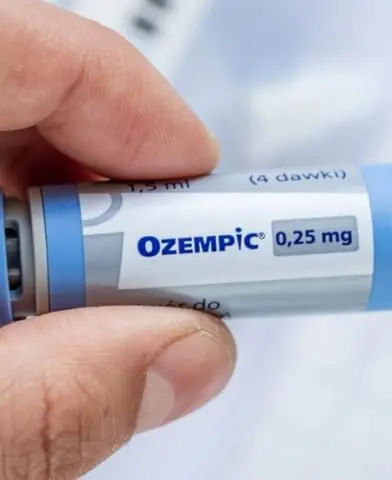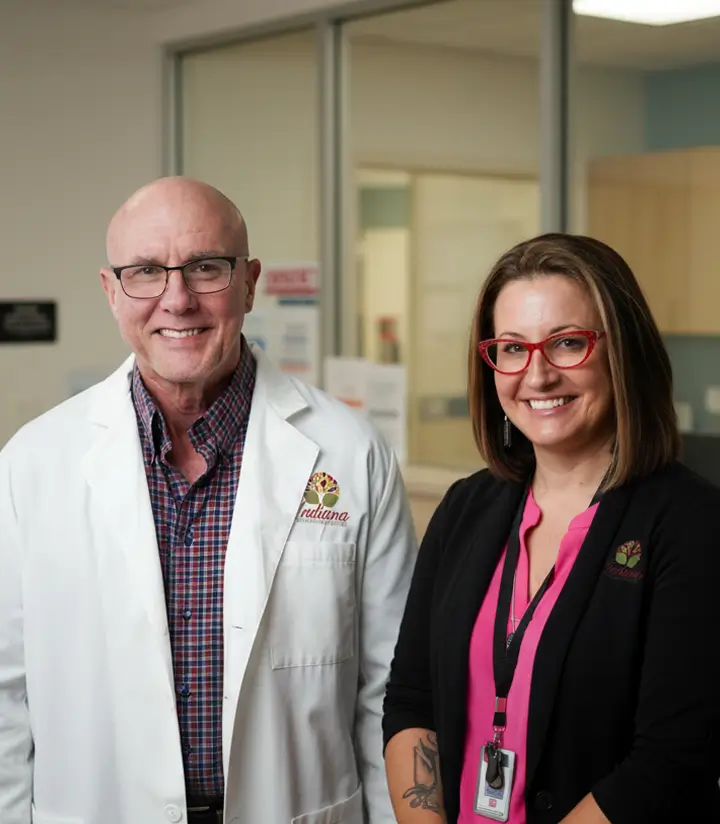
Comparing Residential And Outpatient Treatment
Clinically Reviewed by:
Residential and outpatient addiction treatment programs each have their pros and cons. The treatment that is best for you will depend on a variety of factors. Read on to learn more about the differences and similarities between residential and outpatient treatment.

Key Takeaways
Drug addiction and substance abuse are on the rise across the United States. Here’s what you need to know about treatment:
- Comprehensive treatment plans, including inpatient and outpatient care, are essential for addressing drug abuse.
- Various distinctions exist for inpatient and outpatient rehab, making them suitable for individual needs.
- Healthcare professionals determine the most suitable treatment option for individuals based on their needs.
Call Indiana Center for Recovery at (844) 650-0064 to reserve your space in our program.
What Is Drug Rehabilitation?
Drug rehabilitation is a treatment program designed to help people overcome the challenges of substance abuse. It offers a path towards recovery and a brighter future. In these programs, individuals receive personalized care, counseling, and support to break free from addiction.
The primary goal of drug rehab is to empower individuals to reclaim control of their lives. Participants engage in therapeutic activities, educational sessions, and group discussions, fostering community and understanding.
Residential Drug Rehabilitation
Inpatient drug rehab, also known as residential treatment, is a type of addiction treatment where individuals live at a facility for an extended period to receive intensive and structured care for substance abuse issues. Here are some key features of inpatient drug rehab:
24/7 Supervision
Continuous monitoring by trained professionals ensures immediate response to emergencies, provides accountability and creates a safe and supportive environment crucial for the early stages of the recovery process.
Structured Environment
Inpatient rehab offers a highly structured daily schedule, including therapy sessions, group activities, educational programs, and time for self-reflection. This structure helps individuals establish new routines and coping mechanisms.
Medical And Psychological Support
Inpatient facilities often have medical staff available to address any physical health issues related to substance abuse. This type of treatment program also offers mental health services to address co-occurring disorders like anxiety or depression.
Relapse Prevention
Within the secure environment of inpatient rehab, individuals undergo intensive relapse prevention training, focusing on identifying and addressing triggers, mastering coping mechanisms, and instilling a strong foundation for maintaining sobriety upon reintegration into daily life.
Outpatient Drug Rehabilitation
Outpatient drug rehab is a form of addiction treatment where individuals attend treatment services while continuing to live at home and maintain their daily routines. Features of outpatient drug rehab include:
Flexible Schedule
Outpatient programs offer a flexible schedule. This program allows individuals to attend treatment in the evenings, accommodating work or school commitments while providing comprehensive support for addiction recovery.
Access to Support Networks
By maintaining connections with family, friends, and community resources, outpatient rehab emphasizes cultivating a robust support system, providing a vital foundation for encouragement and collective strength throughout the recovery journey.
Continued Work or School Participation
Preserving a sense of purpose and routine, the ability to sustain work or school commitments in outpatient rehab contributes to stability. It facilitates the gradual integration of learned coping skills into real-life situations, fostering a smoother transition to a substance-free lifestyle.
Self-Responsibility
Outpatient rehab places a greater emphasis on individuals taking responsibility for their recovery. This includes actively participating in therapy, implementing learned strategies in daily life, and maintaining a commitment to sobriety.
Differences Between Inpatient And Outpatient Drug Rehab
Inpatient and outpatient drug rehab programs are two distinct approaches to treating substance abuse and addiction. Here are the key differences between the two:
Setting
Inpatient treatment programs involve patients residing in a structured facility, such as a hospital or rehab center, for comprehensive treatment. Outpatient facilities enable patients to live at home while attending scheduled therapy sessions, allowing them to maintain their daily activities.
Intensity of Treatment
Inpatient programs provide intensive 24-hour care and medical supervision, offering immersive treatment. Outpatient treatment allows individuals to maintain their daily routines, with sessions occurring several times a week, typically for fewer hours than inpatient programs.
Medical Supervision
The inpatient program provides constant medical supervision, making it suitable for individuals with severe addiction and co-occurring medical or mental health issues. In outpatient treatment, medical supervision is less intensive and may not be suitable for individuals with severe withdrawal symptoms.
Duration of Treatment
Inpatient treatment generally involves a more extended stay, ranging from 28 days to several months, depending on the individual’s needs and progress. For outpatient treatment, duration varies; individuals may attend sessions for a few hours several times a week for a specified period.
Cost
Inpatient rehab is generally more expensive due to the comprehensive services, accommodation, and 24/7 care provided. Outpatient programs are often more cost-effective as individuals do not require room and board, and the treatment structure is less intensive.
Social Support
The inpatient program provides a supportive community within the facility, offering constant peer and professional support. In contrast, outpatient relies on the individual’s existing social support system, involving family, friends, or local support groups.
Suitability For Different Needs
Inpatient programs are typically recommended for individuals with severe addiction, co-occurring disorders, or those requiring a highly controlled environment for recovery. Outpatient treatment is more suitable for individuals with less severe addiction and the ability to manage daily responsibilities.
Deciding Which Treatment To Choose
Choosing between inpatient and outpatient drug rehab depends on various factors, including the severity of the addiction, individual needs, and lifestyle considerations. Here are some key factors to consider when making this decision:
Severity of Addiction
Inpatient is typically recommended for individuals with severe or long-term addiction issues requiring constant supervision and a structured environment. In comparison, outpatient is suitable for those with mild to moderate addiction who can maintain some level of self-control and do not require 24/7 supervision.
Medical and Psychological Needs
The inpatient facility provides continuous medical and psychological support, making it suitable for individuals with co-occurring disorders, severe withdrawal symptoms, or complex medical issues. Outpatient treatment is better for those with stable conditions who don’t need continuous monitoring.
Support System
Inpatient care is the best option for individuals who lack a supportive and drug-free living environment or have family members and social situations that contribute to their addiction. Outpatient is suited for those with a strong support system at home and a stable living environment that promotes recovery.
Time Commitment
An inpatient program requires a more significant time commitment, often involving a 28 to 90-day stay or even longer, depending on the program. The outpatient facility allows individuals to receive treatment while continuing with daily responsibilities such as work, school, or family commitments.
Recovery Goals
The inpatient program suits those who need intensive treatment to establish a strong foundation for recovery. The outpatient is appropriate for those who may have completed inpatient treatment and are transitioning to a less intensive level of care or for those with less severe addiction issues.
Frequently Asked Questions (FAQ)
What's the difference between inpatient and outpatient treatment?
Inpatient treatment involves residing at a medical facility for continuous care, suitable for severe cases. Outpatient treatment allows patients to receive care without staying overnight, offering flexibility for milder cases. Inpatient is immersive, while outpatient enables individuals to maintain daily routines with periodic appointments.
How do residential and outpatient rehab programs compare?
A residential rehab program involves residing at a treatment center for immersive care, beneficial for intense support. Intensive outpatient programs allow individuals to live at home while attending scheduled sessions, offering flexibility. Residential is intensive, while outpatient accommodates daily life with periodic treatment sessions, suitable for varying recovery processes.
What is outpatient treatment?
Outpatient treatment refers to medical care received without an overnight stay, allowing individuals to return home after appointments. This treatment accommodates daily routines and is suitable for less severe cases, enabling patients to receive necessary medical attention without needing residential care.
Residential vs. Outpatient: Finding Your Fit
Choosing between residential and outpatient treatment depends on your needs, severity of addiction, and ability to maintain daily responsibilities. If you’re unsure which level of care is right for you, Indiana Center for Recovery provides comprehensive assessments to help determine the best treatment approach for your situation.
Our medical detox programs provide supervised withdrawal management to safely manage symptoms when stopping substance use. From there, our addiction recovery program offers therapy, coping skills development, and relapse prevention strategies to support your recovery journey.
When you need intensive, structured support, our residential treatment program provides 24-hour care in a therapeutic environment. For those who can maintain daily routines, our outpatient treatment offers flexible scheduling that allows you to attend therapy while continuing work, school, or family commitments.
Find the right treatment option for you at our treatment centers across Indiana. Call (844) 650-0064 to speak with our team about residential and outpatient options and determine which level of care best meets your needs.






 100% Confidential
100% Confidential
